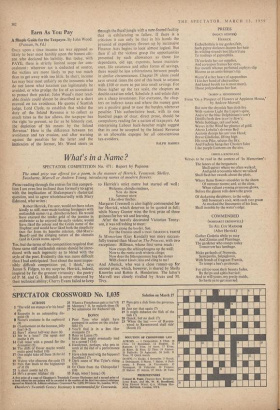What's in a Name?
SPECTATOR COMPETITION No. 471: Report by Papoose The usual prize was offered for a poem, in the manner of Herrick, Tennyson, Shelley, Swinburne, Marvell or Andrew Young, introducing names of modern flowers.
FROM reading through the entries for this competi- tion I am even less inclined than formerly to agree with the implication of Shakespeare's rhetorical question, and to agree wholeheartedly with Mary Edmond, who writes : Robert Herrick, I'm sure, would not have taken kindly to stiff, man-made-looking foreigners with outlandish names (e.g. chincherinchee). He would have enjoyed the tender gold of the jasmine in midwinter as he enjoyed the early violets; would have liked the colour and the Greek name of the Daphne; and would have liked both the simplicity (not far from its humble relation, Old-Man's- Beard) and the clinging nature of the clematis (and its Greek name, again).
Yes, but the terms of the competition required that those same stiff outlandish names should be intro- duced with such ingenuity as to blend with the style of the poet. Evidently this was more difficult than I had anticipated. 'Just about the most impos- sibly difficult competition yet, I think,' says James S. Fidgen, to my surprise. Herrick, indeed, inspired by far the greatest virtuosity : the poetry of P. M. and G. J. Blundell is never obscured by their technical ability; Cherry Evans failed to keep
to Herrick's strict metre but started off well : Welcome, chinchcrinchees, You do blow Summer snow Like silver finches.
Margaret Cresswell is also highly commended for her Herrick, which deserves to be quoted in full; while Nancy Gunter wins the first prize of three guineas for her wit and learning.
After the heavily decorated Victorian Tenny- son, it was refreshing to meet :
Come along the border, Sue,
For the freesias smell a treat. (MARION S. PARES) In Memoriam (Guy Kendall) was more success- fully treated than Maud or The Princess, with two exceptions : Hillman, whose first verse reads :
Now creeps the schizophragma up the wall;
Now to the rustic arch wisteria clings;
Now does the lithospermum hug the stones
With closest kisses; kiss and cling to me!
And Alberick, who was a close runner-up for second prize, which, however, is shared by Sheila Knowles and Robin A. Henderson. The latter's Marvell was closely rivalled by Arcas and M. Tivy.
PRIZES (NANCY GUNTER) HERRICK Eschscholtzia is my garden fair, Such gypsy-darkness haunts her hair Its wilding strands best liken'd are To trailings of gypsophila.
Th'auricula her ear supplies, And coreopsis frames her eyes, Her mouth whence perfumed zephyrs slip Blooms as an antirrhinum's lip.
Warm'd at her heart of agapanthus I kiss her hand of cheiranthus And kneel beside (as is most meet), Those polypodiums her feet.
(ROBIN A. HENDERSON) From 'On a Prospect of Flowers at Appleton House,' • by Andrew Marvell
But now the chymick Sun doth tire With various Light the Lupin's spire, And o'er the blue Delphinium's tow'r Distills fresh dew in ev'ry flow'r; While Solidago, tall and bold, Waves in the Wind her plumes of gold.
Above Lobelia's drowsie Bed Arctotis droops his am'rous Head; Brave Gladiolus, lifting high His rosic Pike, salutes the Sky, And Fuchsia hangs her Clusters faire Like purple Lanterns on the aire.
(SHEILA KNOWLES) Verses to be read in the context of 'In Memoriam': The lances of the bergamots Shall quiver where we often walked;
. And gold crocosmia where we talked Shall flash her swords about the plots,
Where flame flowers smoulder in the sheen Of summer noons; and, at the close, When valiant evening primrose glows. Before the gloom rolls down the green Of darkening shrubbery, to the sedge.
Still bowman's root, with such rare grace As marked the lineaments of his face, Shall tremble by the water's edge.
COM MENDED (MARGARET CRESSWELL)
To ALL COY MAIDENS (After Herrick)
Gather Godetia while ye may And Zinnias and Plumbago. The gardener who stoops today Tomorrow has lumbago.
Make garlands of Nemesia,
Saintpaulia, Salpiglossis, With fronds of fragrant Freesia, To tempt a bee's proboscis.
For all too soon their beauty fades, By thrips and aphis harried;
And so will yours, my pretty maids,
So haste ye to get married.


















































 Previous page
Previous page